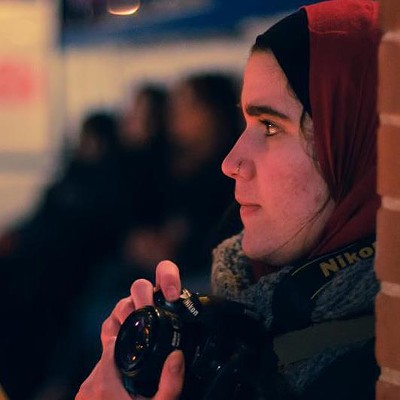But it's not all chatter and political scandal at the Capitol; more than 200 bills have been filed thus far.
Of all the bills that have been filed, only one has specifically targeted Denver. Under SB 40, nine legislators on the Opioids and Other Substance Use Disorders Interim Study Committee are proposing to make Denver the first city in the nation to set up a pilot program for a supervised injection facility, which would provide a safe haven for drug-users — opiate and heroin addicts, especially — to be monitored by health-care professionals while getting high.
Senator Kevin Priola, an Adams County Republican, says he's sponsoring the bill to uphold the "sanctity of life" and so that people don't have to resort to injecting and, potentially, overdosing in public restrooms.
"I believe [opioid abuse] is a serious problem nationwide. I'm a lifelong resident of the Front Range, and as a kid, you could walk into a public bathroom downtown, and now, it's very different," Priola says. "The main reason is people going in overdosing because they need a place to inject."
Of course, a supervised injection site would be useless if cops and public prosecutors cracked down on the congregation of substance abusers. The proposed bill would grant civil and criminal immunity to employees, volunteers and participants of such a facility.
The idea for a supervised injection facilities, while radical in the U.S., isn't a new one. Nationally, cities like San Francisco and Philadelphia are debating whether to launch their own supervised injection facilities in an effort to stem the opioid crisis.
And it's not like anyone is reinventing the wheel here. The U.S. is far behind Canada and nine European countries that, combined, already have ninety supervised injection sites. The researched benefits of these sites are wide-ranging, from reduced needle disposal in public spaces and reduced syringe sharing, which can increase the likelihood of transmitting diseases like HIV, to reduced overdose deaths. These sites can also serve as ground zero to recruit people into addiction treatment.
"We're trying to get people into treatment as opposed to incarceration," Priola says.
The drawback: Denver — or any other U.S. city, for that matter — would be at odds with federal drug laws if an injection site was established, because heroin is a Schedule 1 narcotic and is subject to severe enforcement laws. But this wouldn't be lawmakers' first scuffle with federal authorities if implemented, given Colorado's history with marijuana.
Outside of Denver, the bill would authorize hospitals around the state to serve as clean-syringe exchange sites, where users could trade in their old needles for clean ones, and would grant civil immunity to participants. The state approved clean-syringe exchange programs eight years ago but left the authority to enact such programs with county health boards. At the time, nearly 5,000 injection drug users were in Denver alone, and an estimated 19 percent of AIDS cases in the city and county were attributable to sharing needles, according to a 2008 study by the Denver Office of Drug Strategy.
While SB 40 will be one bill that Denverites will follow closely, there are many more to sift through, and even more that have yet to be drafted and filed.
Here are Westword's top bills to watch so far from the 2018 legislative session.
1. Voter-approval-required bills
- HB 1054 would establish a statewide plastic-shopping-bag tax to support affordable-housing developments.
- SB 1 would allow the Colorado Department of Transportation to issue up to $3.5 billion in revenue bonds and divert 10 percent of state sales tax net revenues to the state highway fund.
- SB 4 would increase spending for full-day kindergarten by authorizing the state to retain all excess tax revenues. Any funds thereafter would go to the state education fund.
- HB 1040 would require the Colorado Department of Corrections to create an incentive plan to attract mental-health professionals in rural parts of the state facing significant shortages.
- SB 14 would require the state to notify victims and the prosecuting attorney of the out-of-state relocation of an inmate within 48 hours. This bill may be related to the out-of-state transfer of Aurora theater shooter James Holmes, which had been undisclosed until last fall.
- SB 59 would create a central law enforcement information-sharing database among at least fifty of the state's law enforcement agencies. Doing so would appropriate $1.9 million in marijuana taxes to be used as grants to help agencies establish their information-sharing programs in fiscal year 2018-2019.
- HB 1059 would make it a crime to not call 911 if another person is in need of assistance.
- SB 48 would give municipalities some regulatory oversight of the oil and gas industry by allowing local governments to exercise land-use authority.
- HB 1037 would allow concealed handgun license holders to conceal-carry on any elementary, middle or high school campus in the state.
- SB 75 would set campaign contribution limits for school district director candidates. Donations would be limited to $500 for an individual and $5,000 for small donor committees.
- SB 83 would establish income-tax credits for private-school tuition or scholarships in 2019.
- HB 1067 would establish a "Right to Rest" law for Colorado's homeless, which would codify their right to use and move freely in public spaces, eat and accept food, rest in public spaces, occupy a legally parked vehicle, and have some expectation of privacy of their property.
- SB 8 would increase the county clerk document surcharge, which the state will use to fund home financing, home purchasing or redevelopment loans for low-income households.
- HB 1072 would prohibit red-ight cameras across the state from being used to ticket traffic violators.













